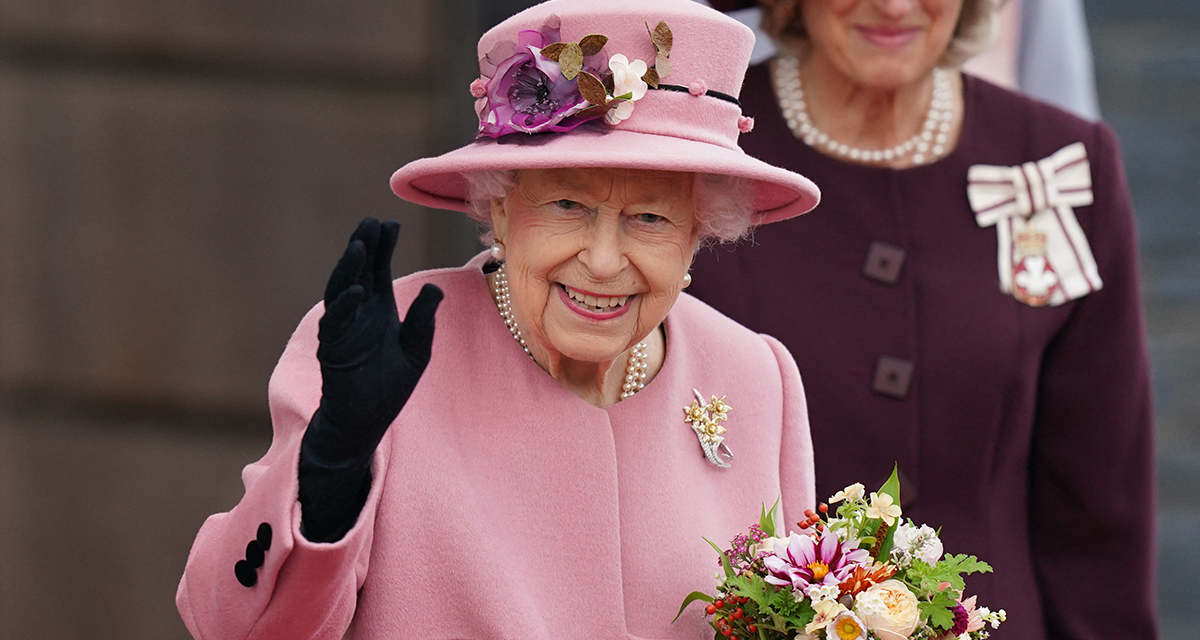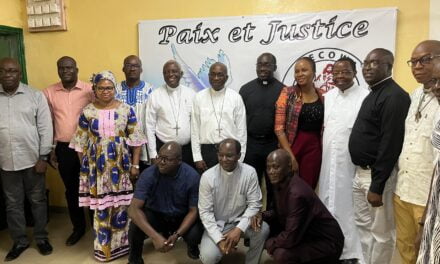La reine Elizabeth II, le monarque au règne le plus long de Grande-Bretagne et un rocher de stabilité pendant une grande partie d’un siècle turbulent, est décédée le jeudi 8 septembre 2022, après 70 ans sur le trône. Elle avait 96 ans. La reine Elizabeth II est restée dans les mémoires pour « certaines valeurs durables de discipline, de travail acharné, de sens du devoir, d’honnêteté et de méritocratie » par les évêques d’Afrique après sa mort jeudi à l’âge de 96 ans.
Lorsqu’elle monta sur le trône en 1952, le Royaume-Uni régnait encore sur une grande partie de l’Afrique, et son règne vit l’ère de la décolonisation de l’Empire britannique. La majeure partie de l’Afrique anglophone appartient désormais au Commonwealth des Nations, une association libre composée principalement d’anciennes colonies britanniques dirigée par le monarque britannique. L’évêque George Nkuo du diocèse de Kumbo, dans la région troublée du Nord-Ouest du Cameroun, a déclaré à Crux que la reine Elizabeth était « un symbole de la royauté et de valeurs bonnes et durables ».
« On se souviendra certainement d’elle comme de celle qui, malgré les changements apportés par l’ère Android, a continué à rappeler au monde certaines valeurs durables de discipline, de travail acharné, de sens du devoir, d’honnêteté et de méritocratie. » L’archevêque Ignatius Kaigama d’Abuja au Nigeria a déclaré à Crux qu’il avait reçu la nouvelle du décès de la reine avec « grand chagrin et tristesse », notant que « la nouvelle de la disparition du monarque le plus ancien de l’histoire britannique et du plus ancien et le plus ancien chef d’État dans le monde, a été un choc.
Il a rappelé qu’Elizabeth était montée sur le trône en promettant de consacrer toute sa vie au service du peuple britannique. « La reine a régné avec grâce, élégance et une éthique de travail infatigable pour remplir cette déclaration », a déclaré Kaigama. Il a dit qu’Elizabeth était le seul monarque britannique que la grande majorité des Nigérians ait jamais connu et qu’elle avait développé « une grande admiration et une affection filiale pour elle ».
« Ce qui a rendu la reine Elizabeth si spéciale, c’est qu’elle a saisi tout le poids spirituel et la responsabilité de sa fonction, et a cherché à l’exécuter dans cet esprit », a déclaré Kaigama. Il a affirmé que la reine plaçait sa foi chrétienne au centre de tout ce qu’elle faisait, « et cela faisait d’elle un pilier de stabilité dans un monde en constante évolution ».
« Sa Majesté était, en effet, l’incarnation du devoir, de la stabilité, de la sagesse et de la grâce. L’axiome « Service inlassablement fait ». Devoir fidèlement accompli », résume son règne », a poursuivi le prélat nigérian. «La reine a touché le cœur de beaucoup avec son service dévoué, en particulier au Commonwealth, qui reste un partenaire commercial, un investisseur et un partenaire de développement important dans de nombreux pays africains, les plus importants étant l’Afrique du Sud et le Nigeria. Nous espérons que le Commonwealth pourra continuer à offrir stabilité et continuité dans les années à venir, en particulier sous le règne du roi Charles III », a ajouté l’archevêque.
Mgr Sithembele Sipuka, président de la conférence épiscopale sud-africaine, a déclaré à Crux que la reine Elizabeth était « une source de cohésion et d’identité pour son peuple ». « Avec tous les échecs moraux qui ont été constatés tant dans la famille royale que dans le pays, la reine Elizabeth était considérée comme un baromètre moral et un idéal de bonne conduite », a déclaré Sipuka.
L’Église copte orthodoxe d’Égypte, dirigée par le pape Tawadros II, a publié une déclaration disant que la reine laisse derrière elle « un grand héritage de noble travail humanitaire et un énorme soutien aux droits de l’homme et à la liberté religieuse ».
«Nous nous souvenons particulièrement de sa relation avec notre Église copte et de son soutien à son existence en Grande-Bretagne pour servir les enfants de l’Église qui y vivent, et ce soutien s’est manifesté en décorant l’évêque Angaelos de l’Église copte orthodoxe au Royaume-Uni de l’Ordre de l’Empire britannique ( OBE) », a déclaré l’église égyptienne dans un communiqué. La reine Elizabeth a été remplacée par son fils aîné, Charles III. Elle sera inhumée le 19 septembre.
O correspondente da RECOWACERAO NEWS AGENCY, RECONA, com sede em Abuja, capital política da Nigéria, indicou que alguns bispos africanos descreveram a falecida rainha Elizabeth como ‘pilar da estabilidade’*
A rainha Elizabeth II, a monarca com reinado mais longo da Grã-Bretanha e uma rocha de estabilidade em grande parte de um século turbulento, morreu na quinta-feira, 8 de setembro de 2022, após 70 anos no trono. Ela tinha 96 anos. A rainha Elizabeth II foi lembrada por “certos valores duradouros de disciplina, trabalho duro, senso de dever, honestidade e meritocracia” pelos bispos da África após sua morte na quinta-feira aos 96 anos.
Quando ela subiu ao trono em 1952, o Reino Unido ainda governava grande parte da África, e seu reinado viu a era da descolonização do Império Britânico. A maior parte da África de língua inglesa agora pertence à Commonwealth of Nations, uma associação livre de ex-colônias britânicas lideradas pelo monarca britânico. O bispo George Nkuo, da diocese de Kumbo, na conturbada região noroeste de Camarões, disse ao Crux que a rainha Elizabeth era “um símbolo da realeza e de valores bons e duradouros”.
“Ela certamente será lembrada como alguém que, apesar das mudanças trazidas pela era Android, continuou a lembrar ao mundo certos valores duradouros de disciplina, trabalho duro, senso de dever, honestidade e meritocracia.” O arcebispo Ignatius Kaigama, de Abuja, na Nigéria, disse ao Crux que recebeu a notícia do falecimento da rainha com “grande tristeza e tristeza”, observando que “as notícias do falecimento do monarca mais antigo da história britânica e do mais antigo e mais antigo chefe de Estado no mundo, foi um choque”.
Ele lembrou que Elizabeth subiu ao trono prometendo dedicar toda a sua vida ao serviço do povo britânico. “A rainha reinou com graça, elegância e uma ética de trabalho incansável para cumprir esta declaração”, disse Kaigama. Ele disse que Elizabeth foi a única monarca britânica que a grande maioria dos nigerianos já conheceu e desenvolveu “grande admiração e afeição filial por ela”.
“O que tornou a rainha Elizabeth tão especial foi que ela compreendeu todo o peso espiritual e a responsabilidade de seu cargo e procurou executá-lo com isso em mente”, disse Kaigama. Ele afirmou que a rainha colocou sua fé cristã no centro de tudo o que ela fez, “e isso a tornou um pilar de estabilidade em um mundo em constante mudança”.
“Sua Majestade era, de fato, o epítome do dever, estabilidade, sabedoria e graça. O axioma, ‘Serviço feito incansavelmente. Dever fielmente cumprido’, resume seu reinado”, continuou o prelado nigeriano. “A rainha tocou o coração de muitos com seu serviço dedicado especialmente à Commonwealth, que continua sendo um importante parceiro comercial, investidor e parceiro de desenvolvimento em muitos países africanos, sendo os maiores a África do Sul e a Nigéria. É nossa esperança que a Commonwealth possa continuar a oferecer estabilidade e continuidade nos próximos anos, especialmente durante o reinado do rei Carlos III”, acrescentou o arcebispo.
O bispo Sithembele Sipuka, presidente da conferência dos bispos sul-africanos, disse ao Crux que a rainha Elizabeth era “uma fonte de coesão e identidade para seu povo”. “Com todas as falhas morais que foram observadas tanto na família real quanto no país, a rainha Elizabeth foi considerada um barômetro moral e um ideal de bom comportamento”, disse Sipuka.
A Igreja Ortodoxa Copta no Egito, liderada pelo Papa Tawadros II, divulgou um comunicado dizendo que a rainha deixa “um grande legado de nobre trabalho humanitário e enorme apoio aos direitos humanos e à liberdade religiosa”.
“Lembramos particularmente seu relacionamento com nossa Igreja Copta e seu apoio à sua existência na Grã-Bretanha para servir às crianças da igreja que vivem lá, e esse apoio se manifestou na decoração do Bispo Angaelos da Igreja Copta Ortodoxa no Reino Unido com a Ordem do Império Britânico ( OBE)”, disse a igreja egípcia em um comunicado. A rainha Elizabeth foi sucedida por seu filho mais velho, Carlos III. Ela será sepultada em 19 de setembro.
The Correspondent of RECOWACERAO NEWS AGENCY, RECONA based in Abuja, the political capital of Nigeria has indicated that some African bishops have described the late Queen Elizabeth as ‘pillar of stability’*
Queen Elizabeth II, Britain’s longest-reigning monarch and a rock of stability across much of a turbulent century, died Thursday Sept. 8, 2022, after 70 years on the throne. She was 96. Queen Elizabeth II was remembered for “certain lasting values of discipline, hard work, a sense of duty, honesty and meritocracy” by bishops in Africa after her death on Thursday at the age of 96.
When she ascended the throne in 1952, the United Kingdom still ruled over much of Africa, and her reign saw the era of decolonizing the British Empire. Most of English-speaking Africa now belongs to the Commonwealth of Nations, a free association of mostly former British colonies headed by the British monarch. Bishop George Nkuo of the Kumbo Diocese in Cameroon’s troubled North West region told Crux that Queen Elizabeth stood as “a symbol for royalty and of good and lasting values.”
“She certainly will be remembered as one who despite the changes brought about by the Android age, continued to remind the world of certain lasting values of discipline, hard work, a sense of duty, honesty, and meritocracy.” Archbishop Ignatius Kaigama of Abuja in Nigeria told Crux that he received the news of the Queen’s passing with “great sorrow and sadness,” noting that “news of the demise of the longest-reigning monarch in British history, and the oldest and longest-serving head of state in the world, came as a shock.”
He recalled that Elizabeth came to the throne promising to devote her whole life to the service of the British people. “The queen reigned with grace, elegance, and a tireless work ethic to fulfill this declaration,” Kaigama said. He said Elizabeth was the only British monarch the vast majority of Nigerians had ever known, and had developed “great admiration and filial affection for her.”
“What made Queen Elizabeth so special was that she grasped the full spiritual weight and responsibility of her office, and sought to execute it with that in mind,” Kaigama said. He asserted that the queen put her Christian faith at the center of all that she did, “and this made her a pillar of stability in an ever-changing world.”
“Her Majesty was, indeed, the epitome of duty, stability, wisdom and grace. The axiom, ‘Service Untiringly done. Duty faithfully fulfilled,’ encapsulates her reign,” the Nigerian prelate continued. “The queen touched the hearts of many with her dedicated service especially to the Commonwealth which remains an important trade partner, investor and development partner in many African countries, the biggest being South Africa and Nigeria. It is our hope that the Commonwealth could continue to offer stability and continuity in years to come, especially, during the reign of King Charles III,” the archbishop added.
Bishop Sithembele Sipuka, the president of the South African bishops’ conference, told Crux that Queen Elizabeth was “a source of cohesion and identity for her people.” “With all the moral failures that have been noted both in the royal family and in the country, Queen Elizabeth was regarded as a moral barometer and an ideal of good behavior,” Sipuka said.
The Coptic Orthodox Church in Egypt, headed by Pope Tawadros II, issued a statement saying the queen leaves behind “a great legacy of noble humanitarian work and huge support to human rights and religious freedom.”
“We particularly remember her relationship with our Coptic Church and her support to its existence in Britain to serve the church’s children living there, and this support was manifested in decorating Bishop Angaelos of the Coptic Orthodox in the UK with the Order of the British Empire (OBE),” the Egyptian church said in a statement. Queen Elizabeth has been succeeded by her eldest child, Charles III. She will be laid to rest on Sept. 19.
- CATHOLIC ARCHBISHOP IN GHANA HAILS POPE LEO XIV AS GOD’S GIFT - 23 mai 2025
- POPE LEO XIV TO APPROVE CANONIZATIONS - 22 mai 2025
- THE EVOLUTION OF PAPAL TRANSPORTATION - 20 mai 2025







